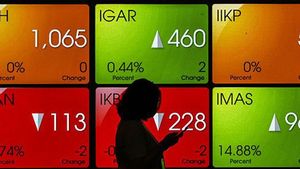JAKARTA - Minister of State-Owned Enterprises (BUMN) and Coordinating Minister for Maritime Affairs Ad Interim Erick Thohir spoke about the government's plan to standardize or generalize film taxes in Indonesia.
Meanwhile, so far, the film tax imposed on cinema tickets has become a portion of regional taxes regulated through regional regulations.
"Well, at that time, I was Coordinating Minister for Maritime Affairs and Interim with Mr. Tito to try to harmonize, at least the film tax for the area is all the same, don't be different," said Erick when met at the DPR Building, Jakarta, Monday, December 4.
According to Erick, with standardization, the entire film tax will be of the same value. That way, the imposition of cinema ticket rates will also be equalized.
"It could be (the same ticket rate). But it's like this, if we look at movies, movie theaters, cinemas today we see the biggest income from national films. Because it can enter to the second level area. This means that the production of the film must be stabilized," he explained.
Erick said the domestic film market share or share share is very potential. Because of that, it is encouraged to grow by more than 64 percent.
According to him, this potential will later become a stimulus for income or income in the regions.
"Regions want additional income, but actually the addition of income to the region itself is actually more films that are screened, it will also increase income, not because of high taxes," explainedha.
"So that national films can develop, again can grow another 64 percent of market share with even more amount, more income," he continued.
The amount of tax
Erick said there would be no new figures regarding the film tax collection to be issued in the form of a presidential regulation (perpres).
He said the figures would still refer to the law (UU).
What is meant is Law Number 1 of 2022 concerning Financial Relations between the Central Government and the Regional Government (UU HKPD). Where, in this regulation, cinema rates are classified as entertainment activities and apply certain goods and services tax (PBJT).
Still referring to the regulation, Article 58 paragraph 1 states that the PBJT tax is set at a maximum of 10 percent.
"No, if possible, all 10 percent. But in reality (now) there are areas that are above 10 percent," he said.
SEE ALSO:
Regarding film tax levies, Erick said, each region will be made a special deposit to help the national film industry.
The institution that will collect is called a fund film.
However, Erick has not explained in more detail who will be assigned to manage the tax payments that will be collected by each region.
According to Erick, there could be a new body.
"(The allocation for Indonesian films was collected) in fund films. Later there will be more discussions between the Ministry of Finance, the Ministry of Tourism and Creative Economy, the Ministry of Education and Culture, the Ministry of Home Affairs and the Coordinating Ministry for Maritime Affairs. We'll see," he said.
The English, Chinese, Japanese, Arabic, and French versions are automatically generated by the AI. So there may still be inaccuracies in translating, please always see Indonesian as our main language. (system supported by DigitalSiber.id)
















